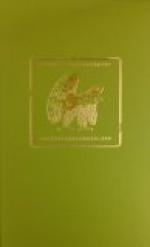The notes of the organ ceased. Tisdale stirred like a man roused from sleep. He turned and started through to the gallery. A woman’s voice, without accompaniment, was singing Martha’s immortal aria, The Last Rose of Summer. It was beautiful. The strains, sweet and rich, flooded the hall and pervaded the upper rooms. Looking down from the railing, he saw Elizabeth and the lieutenant at the entrance below. The men who had installed the organ, were listening too, at the end of the hall, while beyond the open door the crew of the Aquila waited to carry the master aboard. As he reached the top of the stairs, Mrs. Feversham appeared, seated near the invalid in the center of the hall, and finally, as he came to the first landing, there was the diva herself, acknowledging the applause, sweeping backward with charming exaggeration from the front of the stage.
“Bravo!” shouted Frederic. “Bravo! Encore!” She took the vacant seat at the organ, and the great notes of the Good-night chorus rolled to the rafters. Responding to her nodding invitation, the voices of the audience joined her own. It was inspiring. Tisdale stopped on the landing and involuntarily he caught up his old part.
“Tho’ no prayer of mine can
move thee
Yet I wish thee sweet good night;
Now good night, good night, good night!”
She looked up in quick surprise; her hands stumbled a little on the keys and, singing on, she subdued her voice to listen to his. Then, hesitating a little over the first chords, she began the final prelude, and Tisdale, waiting, heard her voice waver and float out soft and full:
“Ah, will Heaven indeed forgive me.”
Her face was still lifted to him. It was as though her soul rose in direct appeal to him, and in that moment all his great heart went down to her in response.
It was over. Morganstein’s heavy “Bravo!” broke the silence, followed by the enthusiastic clapping of hands, Mrs. Weatherbee rose and started down the hall to join Elizabeth and the lieutenant, but Marcia detained her. “It was simply grand,” she said. “I hadn’t believed you had the reach or the strength of touch. This organ was certainly a fine innovation.”
“Sure,” said Frederic hazily. “It will make old Seattle sit up and take notice. Great idea; your schemes always are. Confess though, I had my doubts, when it came to this organ. I hedged and had that other jog built in over there for a piano. We can use it sometimes when we want to rag.”
“It is a splendid instrument; much more expensive than I thought of, I am afraid. But,” and she looked back at the elaborate array of pipes with the exhilaration showing in her face, “it’s like giving the firs and the sea a new voice.”




